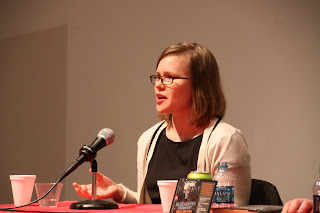Thursday, March 22, 2012
first books reading at the weisman art museum
I still have this lingering connection to the university; because of a complicated spring last year (Maya was born just after the new year after 42 hours of tricky labor and finally, a c-section that led to an infection that eventually led to gallbladder surgery and on and on--it's all there, in the thesis), I deferred my defense to this May as opposed to last May, when my cohort danced merrily out of these halls. When I return, it feels sort of surreal. My life has changed so much: and is so good. I might have balked last spring if I was told it would all turn out fairly perfectly, but it has.
The First Books event is a March tradition for the university; it is built in as an end-event in the wooing of prospective MFA students. Strangely enough, this was my first time attending (see: complicated pregnancy, complicated birth, complicated other such things).
My own advisor, Peter Campion, was the MC of events, telling the audience his job was essentially to "get out of the way" and let the writers read and discuss their work. The last time I saw him speak publicly was two years ago at Bread Loaf, before he was hired at the university to take a space vacated by Michael Dennis Browne, so it was strange to hear that voice in a new context. It was comforting, too, as I started writing the poems for Pine not long after that Vermont experience, and he's been incredibly encouraging with my manuscript, and one day, I hope to be a poet speaking at a First Books event.
There were two poets on the lineup, and the first was an old friend of mine*, Karen Rigby, whose first full-length, Chinoiserie, won the Sawtooth Prize at Ahsahta Press (my dear friend Opal was a finalist for the same prize). The story of her book and work is impressive: Karen, who was writing gorgeous things while in the program, and even published a stunning chapbook, Festival Bone, started fresh post-program, and published a second chapbook, Savage Machinery. But Chinoiserie took on many different titles and guises and she continued to edit as she sent it out: something like fifty to sixty times. In the Q&A, she admitted the Ahsahta submission was a kind of last-ditch effort, a shrug and small hope, so I am grateful this publisher brought the well-deserving book into print. What she didn't mention at the panel were the close calls; I know she had at least one impressive poetry publisher taking a closer look, so it wasn't all full-on rejection. Karen's publisher had a fairly hands-off approach to editing the manuscript; she trusted the poet's vision and after fifty to sixty submissions, the manuscript was already well edited. Of course, Karen admitted, she could have continued to edit the manuscript to eternity, something she shared with fellow first-book panelist Arlene Kim.
Arlene Kim graduated in May of the year I started the program (2008). Her book What have you done to ears to make us hear echoes is another of the Bill Reichard - James Cihlar Milkweed tales; my friend Eireann's* book music to land planes by was also passed on from Bill, who worked with Eireann and Arlene in workshop, onto Jim, who was acquiring poetry books for the publisher not long ago. The opposite story of Karen's--Arlene didn't have to shop around her book, but she did have a close-reading editorial experience, first with Jim and then with Wayne Miller, who took over the final edits of her book. She told us that made her feel incredibly loved--that at no point did she feel either editor was trying to contort the book away from her vision.
There was also a fiction-writer who received his BA here, as well as a non-fiction musician, and an editor from Milkweed who talked to the audience about publishing experiences.
Also: I've read both books of poetry and both have gotten that rare 5/5 rating on Good Reads from me. I do not say this because I am fond of Karen and Arlene, though I am, but because the books are truly wonderful reading experiences and have inspired me to push myself harder as a poet and begin to realize so many wider ways of looking at language and form.
* I met Eireann in an intermediate poetry workshop as an undergraduate, and a few semesters later, we were in a poetry writing group with Karen. I remember seeing E dance in homage to Neruda and eating Karen's pasta and discussing writing notebooks and other tools of the trade.
Subscribe to:
Post Comments (Atom)



















No comments:
Post a Comment